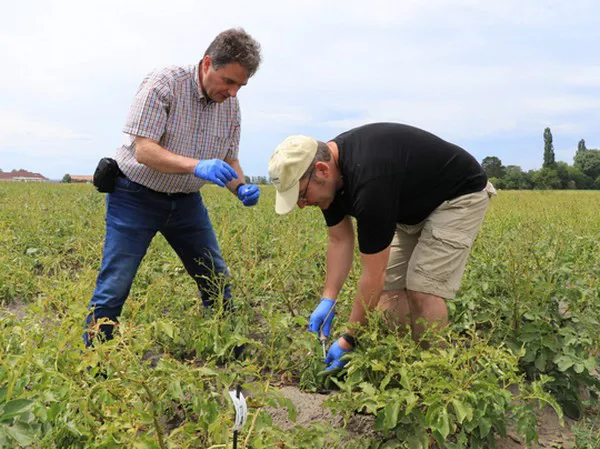The Horizon 2020 EU project Accelerated Development of multiple-stress tolerAnt PoTato (ADAPT), in which Europatat is participating, aims at developing new strategies to make potatoes fit for the challenging growth conditions of the future. Similarly, variety testing needs new strategies to identify and understand the tolerance of different varieties and to support farmers in their variety choice. In 2022, the first year of the Austrian potato variety trials was successfully accomplished.
In 2022, the Austrian Agency for Health and Food Safety (AGES) together with the Austrian potato breeding company NOES (NÖ Saatbaugenossenschaft GmbH) have conducted field trials with selected varieties with the aim to propose improvements to standard VCU protocols. The same set of 16 potato varieties was grown at four different locations in Austria, some of which were characterised by severe drought in 2022. To reflect the importance of the organic sector in both Austria and the EU, the field trials were partially performed under organic farming conditions.
All field trial sites were located in the main Austrian potato growing regions. They were mostly characterised by low annual precipitation and hot and dry summers (Pannonian climate), and one trial site by higher precipitation and a maritime-continental climate. Potatoes were planted in April 2022 and harvested between August and September, depending on the site. To provide a sufficient number of replicate samples for reliable conclusions on abiotic stress tolerance, each variety was grown in four replicate plots in each of the five trials.
The 16 varieties were selected with a focus on representing a wide range of abiotic stress resistance – from tolerant to susceptible. Eleven varieties obtained from potato breeders involved in ADAPT, namely HZPC, Solana, Meijer and NOES, are also being tested for drought and heat tolerance in the ADAPT field trials in Spain and the Netherlands. Five additional varieties from the NOES are adapted to Austrian environmental conditions and were included based on their potential stress tolerance.
Phenotypic evaluation of the varieties was complemented by different technological approaches to identify relevant characteristics associated with potato response to abiotic stress: Irrigation, drone flights, environmental sensors, tuberization process assessment as well as RNA and molecular analysis.
Currently, data from the field trials, such as potato yield, potato quality, drone data and environmental sensor data are being processed at AGES. In addition, RNA sequencing and molecular analysis are ongoing at the University of Vienna and NIB. In 2023, the same trial design is planned to validate the results of the 2022 Austrian variety trials.
For more information about the project, visit our website at adapt.univie.ac.at.
For more information:
Europatat
Rue des Deux Églises 26
1000 Brussels - Belgium
Tel: +32 (2) 229 21 56
secretariat@europatat.eu
www.europatat.eu

